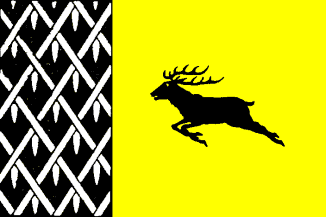 Shipmate Flagchart : http://www.flagchart.net
Shipmate Flagchart : http://www.flagchart.net
adopted 30 Mar 1972

Last modified: 2018-12-15 by rob raeside
Keywords: nunspeet | vierhouten |
Links: FOTW homepage |
search |
disclaimer and copyright |
write us |
mirrors
 Shipmate Flagchart : http://www.flagchart.net
Shipmate Flagchart : http://www.flagchart.net
adopted 30 Mar 1972
The flag, adopted 30 March 1972, is adapted from the Coat of Arms. Yellow is
for sand-drift, black for the soil the houses are built on. The lozenge
field is a barrow, symbol for agriculture. The Veluwe, of which Nunspeet
forms a part, is the only region in the Netherlands, where deer can be
found in the wild.
Jarig Bakker, 9 October 1999
![[Nunspeet Coat of Arms]](../images/n/nl-ge)ns.gif) from Ralf Hartemink's site.
from Ralf Hartemink's site.
Granted 30 Mar 1972.
![[Vierhouten villagehall flag]](../images/n/nl-ge_vh.gif) by Jarig Bakker, 21 Mar 2005
by Jarig Bakker, 21 Mar 2005
At this
webpage is the flag of the village-hall of Vierhouten, a village in
the municipality of Nunspeet, Gelderland province.
The villagehall was opened 10 Oct 1953, and a special flag was hoisted,
which had been made for the occasion. It has a blue field with in the center
a yellow disk, charged with blue "OVO".
From the disk four yellow stripes reach the ends of the flag; on the
four blue fields thus formed are four yellow trees: 2 broad-leaved
trees and two fir-trees. The flag is triangular. The trees symbolize the
name of the village: "Vierhouten" = four woods.
The letters OOV represent: “Ontspanning en Ontwikkeling Vierhouten”
(recreation and Development Vierhouten), the main purpose of the villagehall.
At first this flag was hoisted to signify the the hall was open. Later
it was hidden in an attic and its existence was forgotten. In 2003 Mr Sherlock
Holmes was hired, and he found the attic and the flag, which was afterwards
exposed when the 50th year of the villagehall was celebrated.
Because of its bad condition the flag can't be hoisted anymore, but
a replica has been made by some volunteers, which can be hoisted to show
that there is business in the villagehall.
Jarig Bakker, 21 Mar 2005